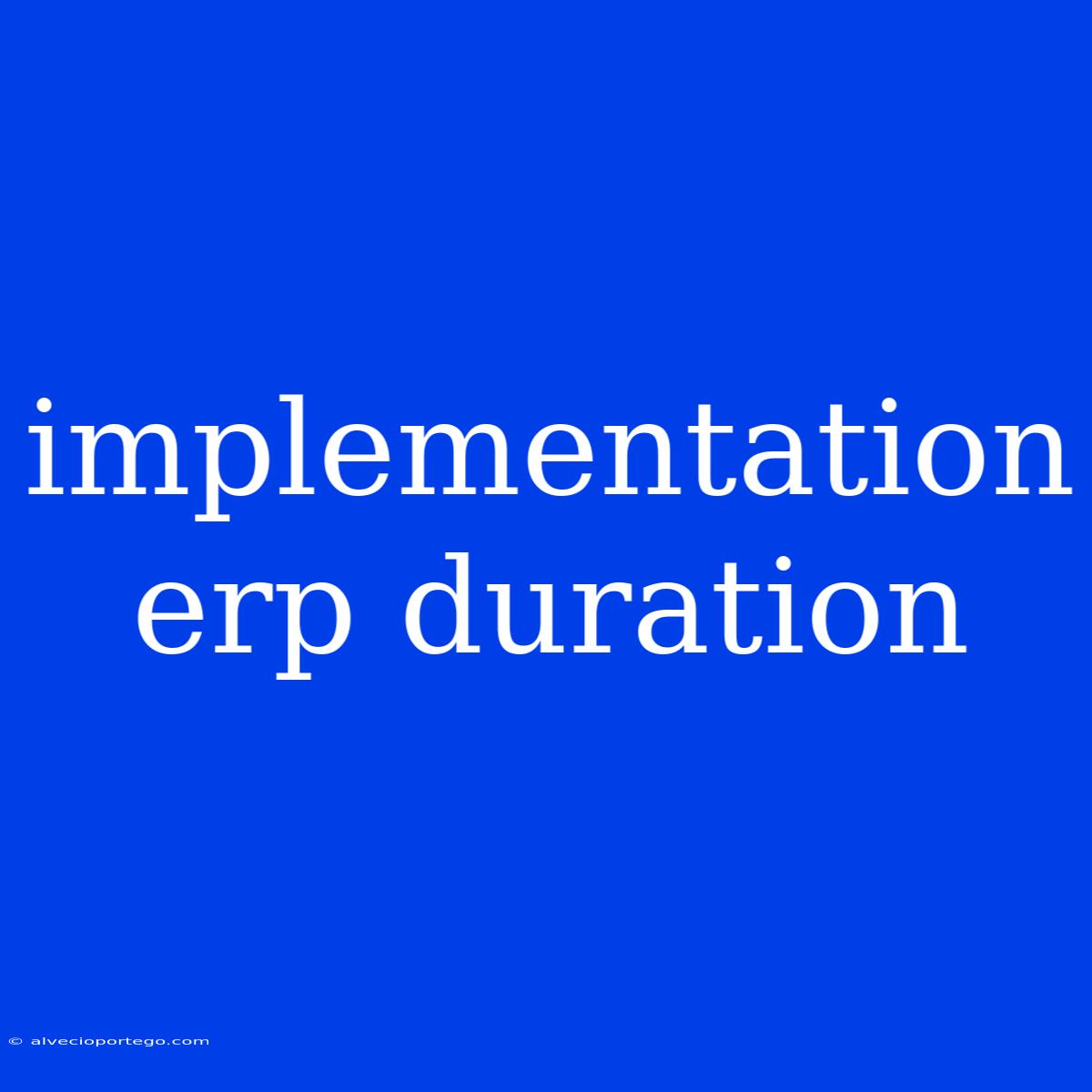Understanding ERP Implementation Duration: Factors, Challenges, and Best Practices
Implementing an Enterprise Resource Planning (ERP) system is a complex and significant undertaking for any organization. A successful ERP implementation not only streamlines business processes but also enhances efficiency, reduces costs, and improves overall performance. However, the duration of an ERP implementation can vary greatly depending on numerous factors.
Factors Influencing ERP Implementation Duration
1. Scope and Complexity:
- The number of modules: Implementing a single module like finance or HR will take significantly less time compared to a full-scale ERP implementation encompassing multiple modules.
- Industry and business processes: Industry-specific needs and unique business processes can add complexity and extend the implementation timeline.
2. Business Size and Complexity:
- Number of employees and locations: Implementing ERP in a larger organization with multiple locations can be more demanding and time-consuming.
- Data migration: Migrating data from legacy systems to the new ERP platform can be a challenging and lengthy process.
3. Project Team and Resources:
- Experience and expertise: The expertise of the implementation team, including internal resources and consultants, plays a crucial role in project duration.
- Availability of resources: Adequate resources, such as skilled personnel, budget, and time, are essential for a smooth and timely implementation.
4. Integration with Existing Systems:
- Number of systems to integrate: Integrating an ERP system with existing applications, such as CRM, marketing automation, or other software, can be a complex and time-consuming task.
- Data integration complexity: Ensuring seamless data flow between different systems requires thorough planning and testing, potentially impacting project duration.
5. Technology and Customization:
- Cloud-based vs. on-premise solutions: Cloud-based ERP systems generally have faster implementation times compared to on-premise solutions.
- Customization requirements: Extensive customization of the ERP system to meet specific business needs can increase the implementation duration.
6. Change Management and Training:
- Resistance to change: Successfully implementing an ERP system requires effective change management strategies to minimize resistance from employees and stakeholders.
- User training: Providing comprehensive training for all users is essential for a successful rollout and adoption of the new ERP system.
Challenges in ERP Implementation Duration
1. Communication Gaps:
- Lack of clear communication and coordination among stakeholders can lead to delays and misunderstandings.
- Effective communication channels and regular project updates are crucial for a successful implementation.
2. Data Quality Issues:
- Inaccurate or incomplete data can significantly impact the implementation process and potentially cause delays.
- Data cleansing and validation are crucial steps to ensure data integrity and reliability.
3. User Acceptance and Adoption:
- Resistance to change and lack of user adoption can hinder the successful rollout of the ERP system.
- Engaging users early on, providing adequate training, and addressing their concerns are vital for adoption success.
4. Integration Challenges:
- Integrating the ERP system with existing systems can be complex and time-consuming, potentially leading to delays.
- Careful planning and thorough testing are essential to ensure seamless integration.
5. Project Management and Resource Allocation:
- Inadequate project planning, resource allocation, and timeline management can significantly impact project duration.
- Effective project management practices and resource optimization are crucial for a successful and timely implementation.
Best Practices for Managing ERP Implementation Duration
- Define a clear scope and objectives: Clearly define the scope, goals, and key deliverables of the ERP implementation project.
- Develop a detailed project plan: Create a comprehensive project plan with realistic timelines, milestones, and resource allocation.
- Establish effective communication channels: Ensure clear and open communication among stakeholders throughout the implementation process.
- Address data quality issues upfront: Thoroughly assess and cleanse data before migration to the new ERP system.
- Focus on change management: Implement effective change management strategies to minimize resistance and ensure user adoption.
- Prioritize user training: Provide comprehensive training to all users to ensure they are comfortable and proficient in using the new ERP system.
- Choose the right implementation partner: Select an experienced and reputable implementation partner with a proven track record.
- Monitor progress and adapt as needed: Regularly monitor project progress, identify potential risks, and make necessary adjustments to the plan.
Conclusion
Implementing an ERP system is a significant investment that can transform an organization's operations. While the duration of an ERP implementation can vary, understanding the factors influencing it and implementing best practices can help ensure a successful and timely rollout. By addressing challenges proactively and fostering collaboration among stakeholders, organizations can optimize their ERP implementation and maximize its benefits.

